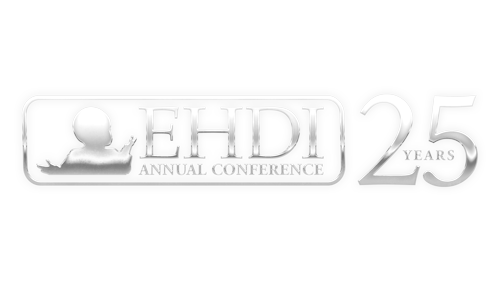2026 Early Hearing Detection & Intervention Conference
March 15-17, 2026 • Jacksonville, FL
3/11/2025 | 11:00 AM - 11:30 AM | Understanding Language Assessment Tools: Enhancing Outcomes for Deaf and Hard-of-Hearing Children | 306/307
Understanding Language Assessment Tools: Enhancing Outcomes for Deaf and Hard-of-Hearing Children
EHDI programs have significantly improved the age identification of permanent hearing loss in newborns. Even with earlier identification, deaf and hard-of-hearing (d/hh) children remain vulnerable to language difficulties and language delay and benefit from early intervention focusing on language access and acquisition. Language assessment plays an important role in monitoring d/hh children’s development and providing direction for intervention. Published or commercially available tools vary in the skills they measure, their strategies for gathering information, and how they report results. Providers are faced with navigating these tools to identify which one best fits the needs of the families and systems they work with. Some tools focus on a specific area, such as auditory skill development or signed language acquisition, while others attempt to capture broad language skills across modalities . Some assessments are designed to gather data quickly to compare a child’s skills to their peers but lack sufficient information to direct intervention activities. In contrast, others provide detailed information helpful in guiding interventions but may not provide robust data for comparison to peers.
This session will review several commonly used language assessments to identify how they evaluate language, report results, and their respective strengths and limitations. The purpose of the session is to examine differences so providers have the information they need to make evidence-based decisions, not to endorse specific measures. By the end of the session, attendees will gain practical strategies for selecting assessments that best fit their needs based on the purpose, target audience, data collection method, and the actionability of the results. This will support EHDI programs as they prepare to report baseline language acquisition outcomes by March 2029.
- 1) Describe at least three commercially available assessment tools
- 2) Compare types of results (scores/data) obtained from different assessment tools
- 3) Describe how language assessment results inform intervention decisions
Presentation:
3545975_18225JamesMcCann.pdf
Handouts:
3545975_18225JamesMcCann.pdf
Transcripts:
CART transcripts are NOT YET available, but will be posted shortly after the conference
Presenters/Authors
James McCann
(Primary Presenter,Co-Presenter,Author,Co-Author), Gallaudet University, james.mccann@gallaudet.edu;
James McCann, Ed.D., CCC-SLP, is a faculty member at Gallaudet University in the SLP program. His teaching and research areas are language acquisition in D/HH children, identifying evidence-based practices to support D/HH children and their families, and working with D/HH children with complex communication needs which may include AAC. Prior to coming to Gallaudet, he worked as an SLP in infant-toddler, early childhood, elementary, and HS D/HH programs.
ASHA DISCLOSURE:
Financial -
• Receives Salary for Employment from Gallaudet University.
• Receives Salary for Employment from HRSA .
Nonfinancial -
No relevant nonfinancial relationship exists.
AAA DISCLOSURE:
Financial -
Financial relationship with Health Resources and Services Administration.
Nature: The three authors receive a full-time salary from Gallaudet University. Part of the salary and participation in the EHDI conference are funded through the Implementation and Change Center Cooperative Agreement (Beacon Center). .
Nonfinancial -
No relevant nonfinancial relationship exists.
Christi Batamula
(Co-Presenter,Co-Author), Gallaudet University, christi.batamula@gallaudet.edu;
Christi Batamula has been working at Gallaudet University since 2005, first as an early childhood educator at Kendall Demonstration Elementary School and then as an assistant professor in the Department of Education. She has earned a Bachelor's degree from Geneva College and a Master's degree in Deaf Education from Gallaudet University. And a Ph.D. from George Mason University with a specialization in International Education and a secondary, interdisciplinary focus on Early Childhood Education and Teacher Education. Her dissertation focused on family engagement among immigrant families with young deaf children. Her area of research interest is working with culturally and linguistically diverse Deaf young children and their families. She has presented her research and knowledge at various national and international conferences. She also has published based on her research and work teaching deaf and hard-of-hearing children and their families.
ASHA DISCLOSURE:
Financial -
No relevant financial relationship exists.
Nonfinancial -
No relevant nonfinancial relationship exists.
AAA DISCLOSURE:
Financial -
Financial relationship with HRSA/MCHB.
Nature: Grantee (ICC center).
Nonfinancial -
No relevant nonfinancial relationship exists.
Bobbie Jo Kite
(Co-Presenter,Co-Author), Gallaudet University, bobbie.kite@gallaudet.edu;
Dr. Bobbie Jo Kite is a Deaf, white and cisgender woman. She is an associate professor in Gallaudet University’s Education program. Her research interests include 1) the Reggio Emilia approach in Deaf Education and 2) Family Language Policy and Planning in families with Deaf children. Dr. Kite is a member of the Deaf community and is fluent in ASL and English enabling her as a Deaf researcher. Dr. Kite started her career as an Early Childhood Educator for six years, then as a University professor and researcher the last 10 years. Her research experience includes conducting mixed methods using interviews, surveys and focus groups. She is a co-investigator in the Family Language Planning Research Team and Assistant Director of the National Beacon Center, Gallaudet University.
ASHA DISCLOSURE:
Financial -
No relevant financial relationship exists.
Nonfinancial -
No relevant nonfinancial relationship exists.
AAA DISCLOSURE:
Financial -
No relevant financial relationship exists.
Nonfinancial -
No relevant nonfinancial relationship exists.
